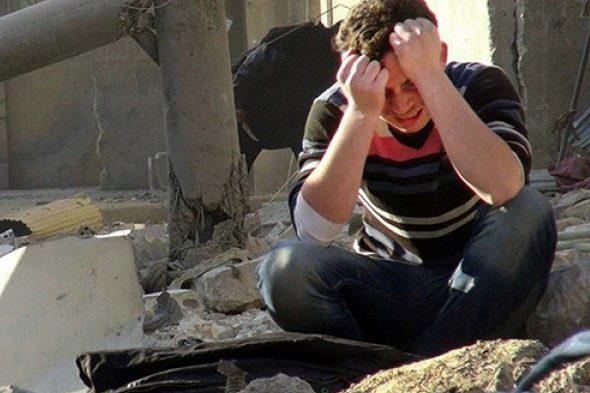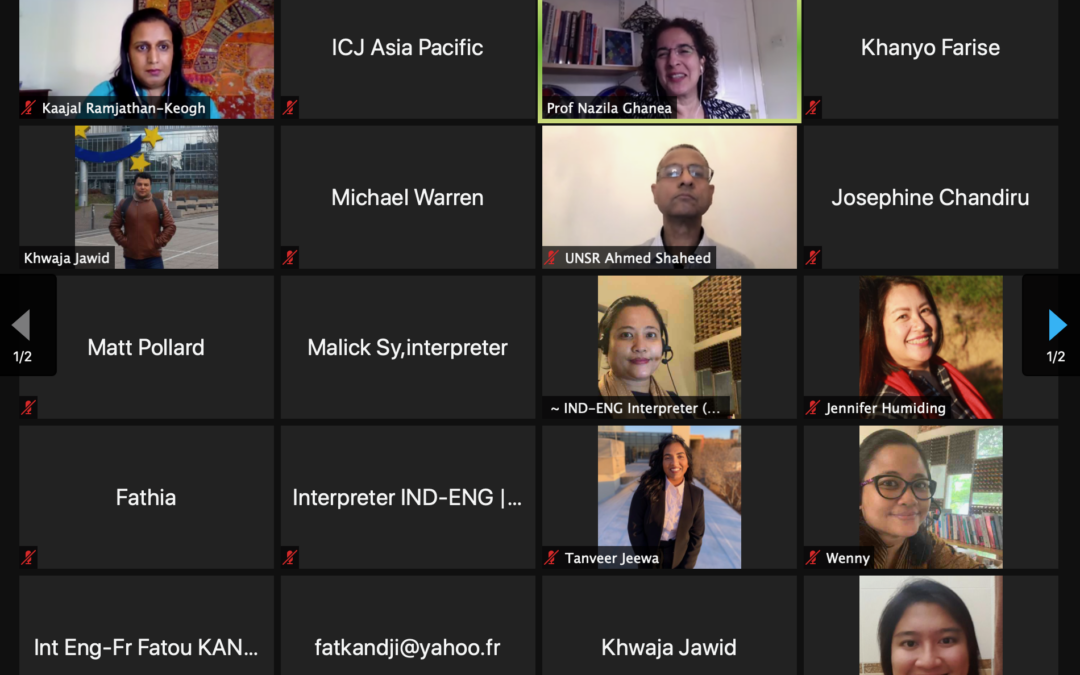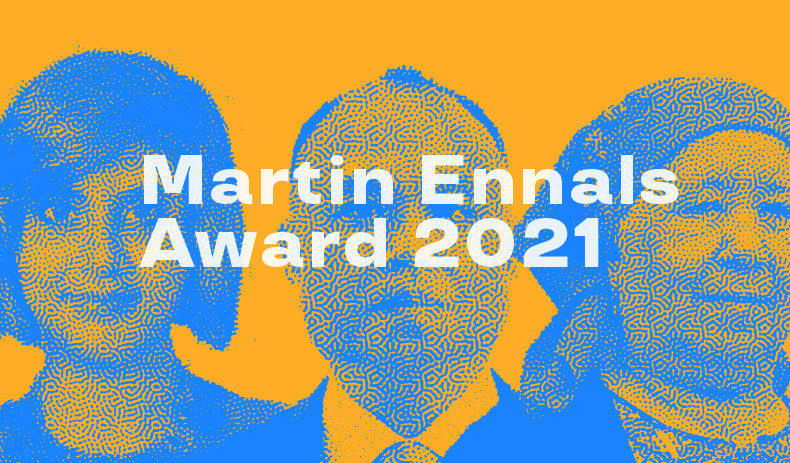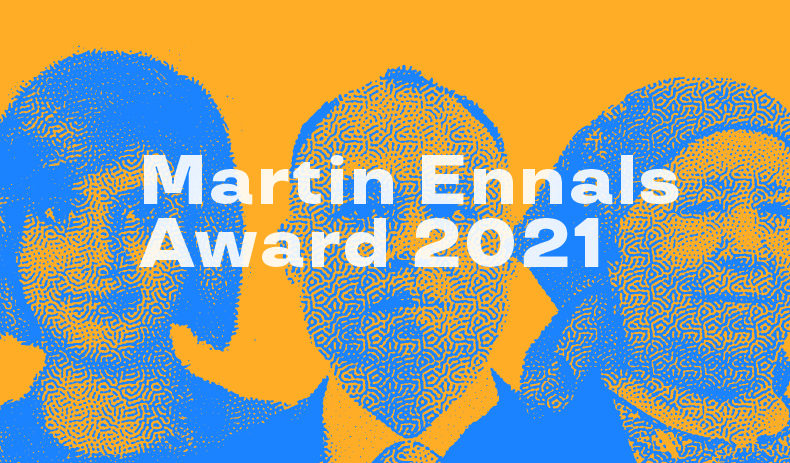
Jan 23, 2021 | News
The ICJ stated today that a newly appointed Commission of Inquiry tasked to review reports on past human rights and humanitarian law violations was unlikely to bring justice to victims of conflict era atrocities.
On 21 January 2021, Sri Lankan President Gotabaya Rajapaksa appointed a three-member Commission of Inquiry (CoI), headed by sitting Supreme Court Judge A.H.M. Nawaz to assess the findings and recommendations of preceding CoIs and Committees on human rights violations, serious violations of international humanitarian law and other such serious offences.
“Sri Lanka has an appalling track record on accountability in relation to toothless inquiry mechanisms.” said Ian Seiderman, ICJ’s Legal and Policy Director. “the tendency to set up these kinds of processes just ahead of sessions the UN Human Rights Council raises the suspicion that the announcement is targeted to deflect robust action by the Council beginning next month”
Sri Lanka is due to be taken up at the 46th session of the UN Human Rights Council on 24 February 2021, where the UN High Commissioner for Human Rights will present her report on Sri Lanka’s implementation of Council Resolution 30/1.
The decision to set up this COI was first announced in February 2020, by the Minister of Foreign Affairs at the 43rd Session of the UN Human Rights Council when he declared the Government’s withdrawal of support for the process under Resolutions 30/1, 34/1 and 40/1.
The Commission is tasked with the responsibility of identifying the “manner in which the recommendations have been implemented so far in terms of the existing law and what steps need to be taken to implement those recommendations further in line with the present Government policy.” It has been given a six-month mandate.
COIs and similar bodies established by successive Sri Lankan governments have been ineffective and deeply deficient in terms of their mandate, functions and independence. As the ICJ has previously documented, such mechanisms have largely been partisan mechanisms for punishing political opponents or for shielding perpetrators and institutions from responsibility.
The ICJ called upon the UN High Commissioner for Human Rights and the Member States to acknowledge the Sri Lankan Government’s categorical inability and unwillingness to ensure accountability domestically and urges the Council to explore viable international alternatives to ensure justice for victims of gross human rights violations.
Contact
For questions and clarifications, please contact Osama Motiwala, Communications Officer – osama.motiwala(a)icj.org

Jan 20, 2021 | News
Justice for serious human rights violations requires more effective evidence collection and prosecution, said victims and experts, at a conference organized by the Kingdom of the Netherlands and the ICJ, today.
Keynote speakers included the Prosecutor of the International Criminal Court, Fatou Bensouda, UN Assistant Secretary General for Human Rights, Ilze Brands Kehri, and victim representatives from Myanmar and Yemen.
“The quest for global accountability has progressed tremendously since the ICJ began working nearly 70 years ago,” said Sam Zarifi, Secretary General of the ICJ.
“Over the last three decades in particular we have seen increasing efforts to seek justice at the international level as well as through national courts.”
“We now have to ensure these efforts are more coherent and are able to gather and preserve evidence critical for the successful prosecution of crimes under international law,” he added.
The ICJ has dedicated a Global Accountability Initiative to combat impunity and promote redress for serious human rights violations around the world through the entrenchment of the rule of law.
The Initiative works at the national, regional, and global level to facilitate victims’ access to justice.
“All over the world, perpetrators of serious human rights violations still go unpunished,” said Stef Blok, Foreign Minister of the Kingdom of the Netherlands.
“But this climate of impunity cannot be allowed to continue,” he added.
Impunity for serious human rights violations remains a significant challenge for a variety of reasons including when certain countries obstruct the work of the International Criminal Court.
In response, UN Bodies, including the Human Rights Council and General Assembly, are increasingly being called upon to establish innovative accountability mechanisms often with an evidence collection and preservation function.
Examples include Syria, Myanmar and Yemen where the lack of an UN Security Council referral to the International Criminal Court led the UN General Assembly and Human Rights Council to take action.
At the same time, accountability mechanisms have indicated challenges, including failures of political support, lack of international cooperation, and difficulties in securing the necessary resources and staffing in the amount and time required to effectively fulfill their mandates within the mandate period.
Mr Blok opened today’s online event, in which over 30 countries, numerous NGOs and victim’ advocacy groups discussed how best to enhance these various efforts. The event was moderated by Sam Zarifi.
Fatou Bensouda, Prosecutor of the International Criminal Court
Radya Al-Mutawakel, President of the Mwatana Organization for Human Rights
Ambia Perveen, Vice chairperson of the European Rohingya Council
Omar Alshogre, Syrian refugee and human rights activist
The full video of the conference can be viewed here.
Contact
Kingsley Abbott, Director of Global Accountability and International Justice, kingsley.abbott(a)icj.org

Jan 20, 2021 | Advocacy, News
Today the ICJ in collaboration with Cordaid issued a report on a webinar series held on 21-22 October 2020 on enhancing access to justice for women in the context of religious and customary laws.
The Webinar discussions aimed to address the challenges of existing inequalities and discrimination experienced by women, girls and persons from other marginalized groups that have intensified amidst a wider increase in attacks worldwide on the rule of law.
The webinar platform served to facilitate exchange of views and strategies among human rights defenders, justice sector actors and persons from the religious community.
Webinar 1 grappled with what are often perceived as conflict between women’s human rights and pathways to justice based on custom and religion.
Webinar 2 involved a discussion of obligations under international human rights law and best practice to ensure access to justice in cultural and religious contexts.
Participants came from Asia, the Middle East and Africa, and exchanged experiences, expertise and perspective on ensuring gender equality and eliminating gender discrimination in the context of custom and religion. The key challenges identified when accessing justice in contexts where customary and religious laws are prevalent include:
- Many women live in situations where laws and policies operate to discriminate against women and there are serious deficiencies exist in the legal protection of women’s human rights and women’s ability to access justice.
- In some places, the plurality of customary and religious laws themselves contribute to a lack of equality among women and hinders access to justice for women.
- Poverty and lack of knowledge of human rights also contribute to inhibiting women from seeking or receiving justice .
- Negative experiences when interacting with justice systems also discourage women from further engaging with the system, and is a barrier to access to justice.
Some preliminary conclusions and recommendations identified through the webinar series include the following:
- All justice actors should understand that under international human rights law the objective of maintaining or promoting particular traditions, customs or religions, is not alone a valid basis for restricting, let alone violating, human rights.
- Human rights actors should continuously seek opportunities for communication and engagement with informal justice systems.
- Religious laws and customary laws can change over time to give effect to women’s access to justice, whether in response to internal or external factors or both.
- Women should be empowered and have a good understanding of their legal status and demanding their rights.
- It is important to build and expand strategic alliances between formal and informal systems to promote access to justice for women.
Contact
Nokukhanya (Khanyo) Farisè, Legal Adviser (Africa Regional Programme), e: nokukhanya.farise(a)icj.org
Tanveer Jeewa, Communications Officer (Africa Regional Programme), e: tanveer.jeewa(a)icj.org
Download
Universal-Webinars a2J women-Advocacy-2021-ENG (full report in English, PDF)
Universal-Webinars a2J women-Advocacy-2021-FRE (full report in French, PDF)
Universal-Webinars a2J women-Advocacy-2021-IND (full report in Indonesian, PDF)
Universal-Webinars a2J women-Advocacy-2021-DAR (full report in Dari, PDF)
Universal-ICJ The Tunis Declaration-Advocacy-2019-ENG (the Tunis Declaration, in PDF)
Universal-ICJ Congresses-Publications-Reports-2019-ENG (the ICJ Congresses booklet, in PDF)
Watch
The first webinar is available here.
The second webinar is available here.
Read also
The report on the Tunis Declaration is available here.
Cordaid, Diverse Pathways to Justice for all: Supporting everyday justice providers to achieve SDG16.3, September 2019, available here.
ICJ/Cordaid Webinar Series addresses the need for equal access to justice for women where religious and customary laws are in force, available here.

Jan 18, 2021 | Новости, Пресс-релизы
Три выдающихся правозащитника из авторитарных государств номинированы на Премию имени Мартина Энналса для правозащитников в 2021 году.
В Туркменистане, одной из самых закрытых стран мира, журналистка Солтан Ачилова освещает нарушения прав человека в своих фоторепортажах. Люджейн аль-Хазлюль из Саудовской Аравии, отбывающая тюремное заключение, является ведущей активисткой движения за права женщин и сторонником гендерного равенства. До обвинительного приговора и тюремного заключения китайский адвокат Ю Веншенг занимался делами в области нарушений прав человека и оказанием юридической помощи правозащитникам. Все Финалисты отличаются исключительным мужеством и глубокой приверженностью вопросам, которые они отстаивают, несмотря на многочисленные попытки властей заcтавить их замолчать. Мы отдадим дань глубокого уважения самоотверженности наших Финалистов во время церемонии награждения Премии имени Мартина Энналса, которая состоится 11 февраля 2021 года в онлайн-режиме совместно с городскими властями города Женевы, которые в течение многих лет оказывают поддержку Премии, демонстрируя приверженность делу защиты прав человека.
Ничто не сможет помешать нам отметить выдающийся вклад Финалистов в дело защиты прав человека
Ежегодно международной Премии для правозащитников имени Мартина Энналса удостаиваются правозащитники и активисты со всего мира, которые демонстрируют исключительное мужество и приверженность делу защиты прав человека, часто рискуя собственной жизнью. В 2021 году Жюри номинировало трех правозащитников, которые вынуждены вести свою деятельность в условиях авторитарных политических режимов.
«Каждый год тысячи правозащитников подвергаются преследованиям, репрессиям, приговариваются к тюремным срокам и даже погибают. «Фонду имени Мартина Энналса» выпала честь отметить заслуги Финалистов 2021 года, которые проделали огромную работу во благо других людей и чьи непростые судьбы символизируют вызовы, с которыми в настоящее время сталкиваются активисты правозащитного движения», – заявила Изабель де Сола, директор «Фонда имени Мартина Энналса».
Финалисты 2021 года
«Авторитарные государства, как правило, считают, что посадив за решетку правозащитников или подвергнув цензуре их деятельность, их имена скоро забудут. Казалось, что во время пандемии коронавируса локдаун и самоизоляция не дадут людям возможность выражать свою точку зрения. Финалисты этого года являются прямым доказательством того, что это совсем не так», – считает Председатель Жюри Ханс Тулен.
В Туркменистане, одном из самых закрытых государств мира, полностью отсутствуетсвобода слова, а независимые журналисты осуществляют свою деятельность на свой страх и риск. Фотожурналист Солтан Ачилова (71 год) освещает нарушения прав человека и социальные проблемы, затрагивающие повседневную жизнь обычных туркменских граждан. Несмотря на репрессивный режим в стране и личные трудности, Солтан является одним из немногих журналистов, которые осмеливаются публиковать свои статьи под собственным именем.
В Саудовской Аравии женщины до сих пор сталкиваются с различными формамидискриминации по гендерному признаку. В «Докладе о глобальном гендерном разрыве» 2020г. , опубликованном Всемирным экономическим форумом, Саудовская Аравия попала в число десяти стран с самыми худшими показателями. Люджейн аль-Хазлюль (31 год) была одним из лидеров движения за право женщин на управление автомобилем и выступала за отмену системы опекунства мужчин над женщинами. В 2018 году вместе с другими активистками она получила тюремный срок по статье, связанной с угрозой национальной безопасности. Люджейн подвергали пыткам, помещали в одиночную камеру и отказывали в предоставлении медицинской помощи. 28 декабря 2020 года ее приговорили к пяти годам и восьми месяцам тюремного заключения.
Более 300 правозащитников и юристов бесследно исчезли или были арестованы в 2015году в Китае во время крупномасштабной кампания травли правозащитников и адвокатов, получившей название «Гонения 709». Успешный юрист, занимающийся корпоративным правом Ю Веншенг (54 года), отказался от своей карьеры, чтобы в качестве адвоката защищать одного из задержанных юристов, а вскоре был арестован сам. Ю Веншенг находится в тюрьме уже почти три года, где ему раздробили руку, а состояние его здоровья ухудшается.
MEA Finalists Bios-2020-RUS

Jan 18, 2021 | Communiqués de presse, Nouvelles
Soltan Achilova, Loujain AlHathloul et Yu Wensheng, trois éminent-e-s défenseur-euse-s des droits humains qui mènent leur combat pour les libertés dans des États autoritaires sont les finalistes du Prix Martin Ennals pour les défenseur-euse-s des droits humains 2021. La CIJ est membre du jury.
Au Turkménistan, l’un des pays les plus isolés au monde, Soltan Achilova documente les violations des droits humains par le biais du photojournalisme.
Loujain AlHathloul est une éminente défenseuse de l’égalité des sexes et des droits des femmes détenue en Arabie saoudite.
L’avocat Yu Wensheng a défendu les droits de plusieurs de ses compatriotes et de militants des droits humains avant sa condamnation et son emprisonnement en Chine.
Les finalistes se distinguent par leur courage et leur engagement infaillible pour les causes qu’ils défendent malgré les nombreuses tentatives de leurs gouvernements respectifs de les réduire au silence.
« Chaque année, des milliers de défenseur-euse-s des droits humains sont persécuté-e-s, harcelé-e-s, emprisonné-e-s, voire tué-e-s. C’est un honneur pour la Fondation Martin Ennals que de célébrer les finalistes de notre Prix 2021, qui ont tant fait pour les autres ; les épreuves qu’ils ont traversées sont emblématiques de la précarité à laquelle se retrouve confronté le mouvement des droits humains aujourd’hui », note Isabel de Sola, directrice de la Fondation Martin Ennals.
« Les États autoritaires tendent à croire qu’il suffit d’emprisonner ou de censurer les défenseur-euse- s des droits humains pour que le monde les oublie. Pendant la pandémie de COVID-19, on aurait pu s’attendre à ce que les mesures de confinement parviennent à davantage empêcher les gens de s’exprimer. Les finalistes de cette année sont la preuve vivante que rien n’est plus éloigné de la vérité », ajoute Hans Thoolen, président du Jury.
Les finalistes 2021
Au Turkménistan, l’un des pays les plus isolés du monde, la liberté d’expression est inexistante et les journalistes indépendants travaillent au péril de leur vie. Soltan Achilova, une photojournaliste âgée de 71 ans, documente les violations des droits humains et les problèmes sociaux qui touchent les Turkmènes dans leur vie quotidienne. C’est l’une des rares journalistes du pays à oser signer des articles indépendants malgré le contexte répressif dans lequel elle travaille et les épreuves qu’elle a traversées.
En Arabie saoudite, les femmes sont encore confrontées à plusieurs formes de discrimination de genre : le Royaume figure parmi les dix derniers du classement établi par le Rapport 2020 sur la parité entre les hommes et les femmes dans le monde, publié par le Forum économique. Loujain AlHathloul, 31 ans, a été l’une des principales figures du mouvement « Women to drive » et milite pour l’abolition du système de tutelle masculine. Elle a été emprisonnée en 2018 pour des motifs liés à la sécurité nationale avec plusieurs autres militantes. Torturée, privée de soins médicaux et placée en cellule d’isolement, Loujain a été condamnée à cinq ans et huit mois de prison le 28 décembre 2020.
En Chine, plus de 300 militants des droits humains et avocats ont disparu ou ont été arrêtés en2015 lors de la vague de « répression 709 ». Yu Wensheng, 54 ans, a abandonné sa carrière florissante d’avocat d’affaires pour défendre l’un de ces avocats détenus, avant d’être lui-même arrêté. Yu Wensheng est aujourd’hui détenu depuis près de trois ans ; on lui a écrasé la main droite en prison et son état de santé se détériore de jour en jour.
Cérémonie de remise du Prix en ligne le 11 février 2021
Le Prix Martin Ennals 2021 sera remis à l’un-e des trois finalistes le 11 février 2021 lors d’une cérémonie en ligne co-organisée par la Ville de Genève (Suisse) qui soutient le prix depuis de nombreuses années.
Contact
Olivier van Bogaert, directeur media & communications, représentant la CIJ dans le jury du MEA, t: +41 22 979 38 08 ; e: olivier.vanbogaert(a)icj.org
Chloé Bitton, responsable de la communication, Martin Ennals Foundation, t +41 22 809 49 25 e: cbitton(a)martinennalsaward.org
MEA Finalists Bios-2020-FRE (Bios des finalistes, PDF)









